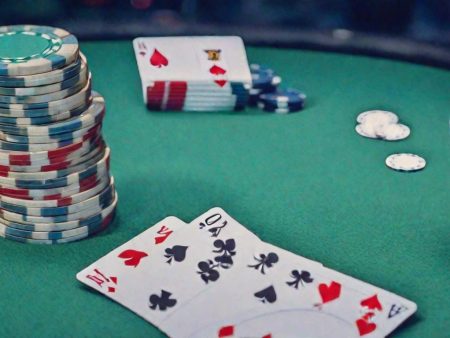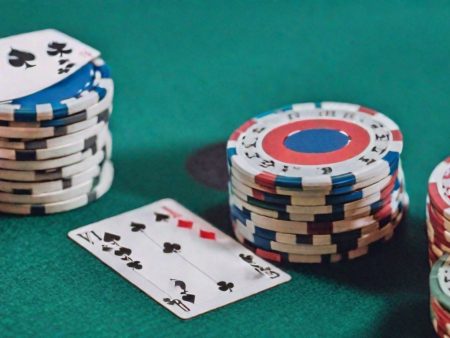Folding in poker is one of the most crucial actions a player can take during a hand. It involves discarding your cards and opting out of continuing with the hand. Players typically fold when they believe their hand is too weak to compete for the pot, saving their chips for future hands where they might have a stronger hand.
To apply your poker skills effectively, it’s essential to choose a reliable, licensed online casino. This way, you can enjoy a safe and regulated gaming environment. The best legal online casinos provide a variety of games such as slots, roulette, poker, and more. They are operated in accordance with local regulations and licenses, ensuring fair gameplay. Players are also protected by robust security systems, and many casinos offer free bonuses for newcomers, making the game more engaging and rewarding.
Key Aspects of Folding in Poker
Folding serves as a tactical move in poker, allowing players to minimize their losses when their hand isn’t strong enough. By folding, players avoid losing money on a hand that they are unlikely to win, preserving their chips for future, more favorable situations. In some cases, players may even fold strong hands strategically, aiming to create a conservative image and force their opponents to play more aggressively.
Timing your fold is critical to your poker strategy. The decision depends on factors like the strength of your hand, the betting actions of your opponents, and the current stage of the game. For example, folding preflop with a weak hand is common, but making the same decision postflop can be trickier. Understanding when and how to fold is an essential skill in poker. It allows players to manage their resources wisely and make informed decisions that can lead to long-term success at the table.
Read also: What is a Drop Range in Poker?
When Folding Is the Right Choice
Knowing when to fold can protect your chips and prevent unnecessary losses. Here are some key situations when folding is the right call:
- Weak Starting Hand: If your starting hand is poor and has little chance of improving, folding is a wise choice. For instance, hands like 2-7 in Texas Hold’em are notoriously weak and unlikely to win.
- Aggressive Betting by Opponents: If your opponents are making large bets or raises that suggest they have strong hands, folding can help you avoid further losses if your hand isn’t competitive.
- Unfavorable Community Cards: If the flop, turn, or river cards don’t improve your hand, and the chances of getting a better hand are slim, it’s a good time to fold.
- Aggressive Players at the Table: If you’re up against players who consistently raise and play aggressively, folding can minimize your losses while waiting for a better opportunity.
- Early Position: In early positions, where you have less information about the other players’ actions, folding weak hands is often the safest option.
Remember, folding isn’t a sign of weakness—it’s a strategic decision that helps you manage your chips and stay in the game longer. A strong poker player knows when to fold to avoid risky situations and wait for more favorable hands.
When Folding Can Be a Mistake
Although folding is a crucial tool in poker, it can also be a mistake in certain situations:
- Folding Too Often: If you fold too frequently, your opponents may catch on and start exploiting your passivity. This could lead to missed opportunities, especially when playing against weaker players.
- Late Position Advantage: If you’re in a late position and you have a chance to gain a good positional advantage, folding can sometimes be a missed opportunity. In these situations, it’s important to assess the potential value of staying in the hand.
- Unpredictable Opponents: If you’re up against players with an unpredictable playing style, folding too often can be a mistake. In such cases, it might be better to take a more active approach and adjust your strategy accordingly.
- Potential for a Bluff: Sometimes, even with a weak hand, folding can be a mistake if you can use that hand to bluff. If your opponents are holding stronger hands, you could potentially trick them into folding by making a bold move.
- Tournament Risk-Taking: In poker tournaments, there are moments when taking calculated risks is essential to accumulate chips and advance. Folding too frequently in such situations can limit your chances of winning.
While folding is an important element of poker strategy, it should never be the default choice. Successful players can adapt to different scenarios and know when to stay in the hand, even with a weak starting hand, to maximize their potential rewards.
Read also: What is a complete set in poker.
Common Mistakes by Beginners
New players often make several standard mistakes, such as:
- Playing with Weak Hands: Beginners sometimes hold on to weak pocket cards, hoping for a miracle draw, which can lead to substantial losses.
- Lack of Understanding of Positions: Many newcomers don’t fully understand the significance of positions at the table, leading to hasty and illogical decisions.
- Overreliance on Unsuccessful Draws: New players may hold out hope for a draw even when the odds are against them, leading to unnecessary losses.
- Folding Without Considering Alternatives: Beginners often fold too quickly in the face of large raises or in difficult situations, without fully evaluating their options.
Avoiding these common mistakes comes with experience. By studying poker fundamentals, analyzing your play, and learning from each game, you’ll be able to make more informed decisions and improve your success at the table. For more insights into the gambling world, feel free to check out our blog. Want to understand how casinos work? Read the betting and casino guide and become a more informed player!
FAQ: What is a Fold in Poker: When a Pass is Necessary and When it is a Mistake
What does “fold” mean in poker?
In poker, to "fold" means to discard your hand and forfeit the round. When you fold, you give up your cards and any claim to the pot, choosing not to continue with the hand. This decision is usually made when a player believes their hand is not strong enough to compete with the bets on the table.
When is it necessary to fold in poker?
It is necessary to fold in poker when your hand is unlikely to win against your opponents' hands, or when the pot odds don't justify the cost of continuing. If you're facing a large bet and your hand isn't strong enough to justify a call, folding is often the best choice to minimize losses and preserve your chips for a better opportunity.
Can folding ever be a mistake in poker?
Yes, folding can be a mistake if you fold too early or too often in situations where you could have had a winning hand or potentially bluffed your way to victory. Over-folding can leave you with a passive strategy and fewer chips. However, not folding when you should—especially when facing a strong bet with a weak hand—can be an even bigger mistake, leading to unnecessary losses.
How do I know when to fold in poker?
Knowing when to fold requires assessing the strength of your hand, the betting patterns of your opponents, and the overall situation at the table. If your hand is weak relative to the community cards and you're facing aggressive betting from multiple opponents, it's generally a good idea to fold. However, if your opponents' actions suggest weakness, you may choose to stay in and potentially win the pot with a bluff.
What are the risks of folding too much in poker?
Folding too often in poker can cause you to lose out on opportunities to win pots, especially in situations where you could have made a good hand or bluffed successfully. Over-folding can also make you predictable to your opponents, as they will learn that you only stay in hands with strong cards, which allows them to adjust their strategies accordingly.
What are the risks of not folding when I should in poker?
Failing to fold when necessary can lead to losing more chips than you intended. If you're holding a weak hand and refuse to fold, you may end up paying for a stronger hand that will beat yours. It can also put you in difficult situations where you're forced to make tough decisions with your remaining chips.
How can I improve my folding strategy in poker?
Improving your folding strategy involves learning to recognize when a hand is unlikely to win and when the odds of continuing are not in your favor. Practice reading the betting patterns of your opponents, understanding pot odds, and evaluating the strength of your hand relative to the board. A well-timed fold can save you chips and help you make better decisions throughout the game.






